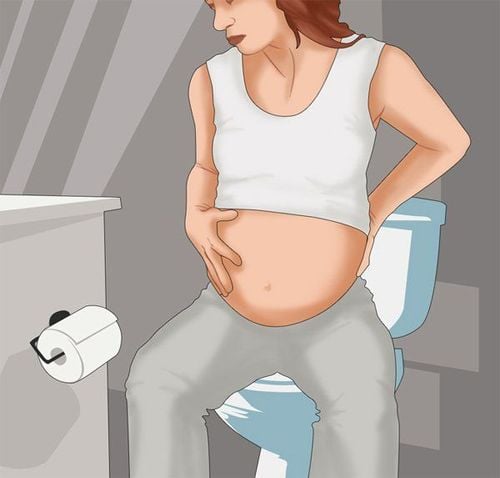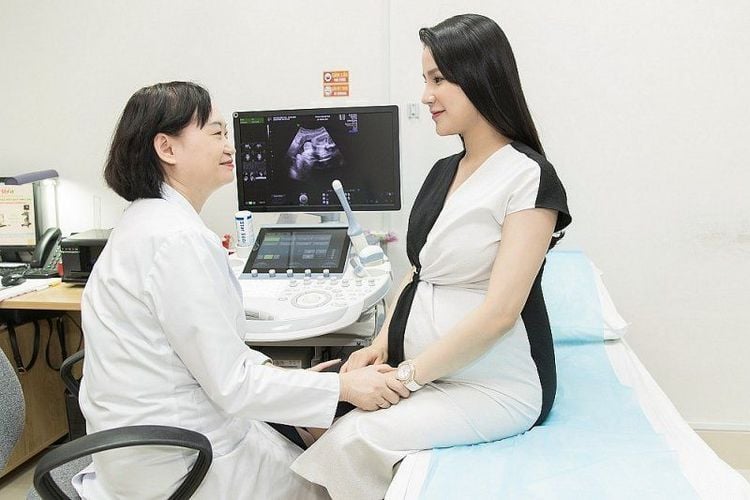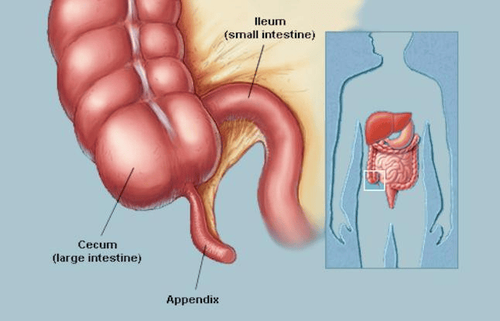This is an automatically translated article.
The article is professionally consulted by Master, Doctor Vu Van Quan - Gastroenterologist - Department of General Surgery & Anesthesiology - Vinmec Hai Phong International General Hospital1. Why do pregnant women get appendicitis?
In the human body, the appendix is located on the right side of the abdomen, one end connecting with the large intestine. Although little noticed, when problems occur, the appendix can be life-threatening. Accordingly, appendicitis is a condition in which the appendix becomes inflamed and filled with pus, causing pain.
In fact, appendicitis can happen to anyone and at any time, pregnant or not. However, some of the following causes can be identified as the main causes of appendicitis in pregnant women:
Infections: Stomach infections can affect the appendix, causing appendicitis in pregnant women. Obstruction: Sometimes, a hard stool can get stuck in the appendix, causing appendicitis in a pregnant woman.

2. Diagnosis of appendicitis in pregnant women
To diagnose appendicitis in pregnant women, it is necessary to pay attention to the following symptoms:2.1 Clinical symptoms Clinical symptoms in the first 3 months of pregnancy.
Clinical symptoms when pregnant women with appendicitis are not different from non-pregnant women:
Fever, rapid pulse. Pain in the right iliac fossa. Vomiting usually occurs later in pregnancy but is sometimes mistaken for morning sickness in early pregnancy. Mac Burney sign (positive), abdominal tenderness in the right iliac fossa. Vaginal examination: The uterus is large in proportion to the gestational age, the right sac is not full, and it is painful to press. Clinical symptoms in the last 6 months of pregnancy
Because the fetus develops more than the first 3 months of pregnancy, the uterus often pushes the appendix up and squeezes out the abdominal wall, so the symptoms are often more complicated, causing appendicitis In pregnant women, it is difficult to diagnose, including the following symptoms:
High fever, rapid pulse. Pain is usually higher than normal. The abdominal pain was getting worse and worse. Disorders of intestinal motility such as: constipation, diarrhea and functional intestinal paralysis. Examination: Uterine contractions due to uterine stimulation. When examining, it is necessary to put the pregnant woman on her back, push the uterus to the right with her hand, the woman often complains of pain, or let the woman lie on the left side so that the pregnant uterus is pushed to the left, often appendicitis is detected, if pressed on the fossa area. Right iliac, right lower quadrant will help identify the pain point more clearly. Vaginal examination combined with abdominal manipulation: The right sac is not full, with little pain.

Need to differentiate appendicitis in pregnant women with the following diseases:
In the form of severe infection syndrome, it should be distinguished from:
Purulent right pyelonephritis, urinary tract infection such as urinary tract infection. pain, burning urine, hematuria ...). Acute cholecystitis (fever, gallbladder pain...). Adjunctive inflammation (pain on both sides of the iliac fossa, fever). In the absence of fever, mainly based on pain, it should be distinguished from:
Initiation of labor. Postvegetal hematoma (in vegetative abruption). Renal colic pain, liver abscess pain. Complicated ovarian tumor (twisting). If appendicitis in pregnant women is not operated on in time, acute appendicitis will turn into appendicitis or peritonitis, which can cause miscarriage. After delivery, the disease often progresses more seriously because the uterus shrinks, causing the pus to spread into the abdomen. Accordingly, patients often suffer from infertility and ectopic pregnancy due to secondary appendicitis affecting the diameter of the two fallopian tubes.
More dangerous, appendicitis in pregnant women also causes premature birth, stillbirth in the uterus and severe infection for the baby at birth.

3. How to treat appendicitis in pregnant women?
In order to ensure the health of both mother and fetus, if lower-level hospitals diagnose a pregnant woman with appendicitis during routine examination, it is necessary to transfer the pregnant woman to a higher-level hospital for specialized doctors to examine and diagnose. and provide treatment, because the diagnosis of appendicitis in pregnant women is difficult to detect.When transferring pregnant women to higher levels, if the pregnant woman is diagnosed with appendicitis, surgery should be performed early. The treatment methods for appendicitis in pregnant women are as follows:
Mac Burney's incision: If the appendix in a normal pregnant woman also needs to remove the appendix and then suture the root. During surgery, it is necessary to try to avoid touching the uterus to reduce the risk of uterine contractions. At the same time, the appendix must be checked for secondary inflammation, but it must not be removed to avoid Removal of the ovary with the corpus luteum of pregnancy. If it is a purulent appendix or peritonitis due to a ruptured appendix, surgery should be performed to remove the appendix, wash the abdomen, and perform drainage. During labor, if it cannot be prevented, try to give birth naturally, in case it is not possible to give birth naturally, cesarean section followed by appendicectomy, if necessary, partial hysterectomy can be performed. To minimize miscarriage, premature delivery, before and after caesarean section, women must use tocolytic drugs (Papaverin) and Progesterone to help maintain the development of the fetus. After surgery for appendicitis in pregnant women, it is necessary to pay attention to the use of high-dose injectable antibiotics (can be based on the antibiotic chart at the time of taking purulent inflammatory fluid).
Appendicitis in pregnant women is often difficult to diagnose, especially in the last 6 months of pregnancy. However, because appendicitis has a complicated progression, it is necessary to detect it early and solve it surgically to avoid affecting the health of the mother and the fetus.
Vinmec International General Hospital is applying laparoscopic appendectomy to successfully treat many complicated appendicitis cases. With outstanding advantages in facilities and modern machinery system, Vinmec is increasingly appreciated not only in laparoscopic appendectomy but also in many other techniques.
The medical team performing the surgery are highly qualified and experienced, ready to handle even when unexpected complications occur. After surgery, the patient will be cared for and closely monitored, rested in a high-quality, international-standard ward, providing maximum support for the recovery process.
Please dial HOTLINE for more information or register for an appointment HERE. Download MyVinmec app to make appointments faster and to manage your bookings easily.














